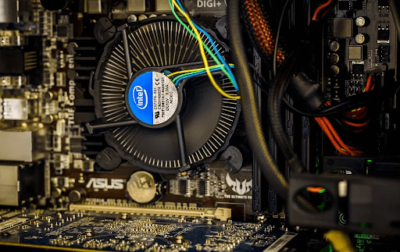How many fans are good for a PC?

A lot of people ask me if they should buy a new computer or upgrade their old one. The answer is simple – it depends on what you want to use it for. If you’re looking to play games, watch movies, edit photos, or create art, then you’ll probably want a powerful machine.
If you’re looking to browse the web, check email, write documents, or run programs, then you’ll probably be happy with a less powerful system.
But there’s another factor to consider – the number of fans your computer has. A fan is a device that blows air across a surface to keep it cool. Fans are used in computers because they allow heat to escape, similar to how cooling mechanisms in industrial machines like the Universal Cylindrical Grinding Machine help maintain optimal temperature for efficient operation.
So, how many fans does your computer have? It’s an important question to ask yourself before buying a new computer.
How many fans do you need for good airflow?
The first thing I look at when deciding whether my computer needs more fans is its power supply unit. This is where all the electricity comes from and converts into usable energy. Most PSUs come with two fans: one large front-facing exhaust fan and one smaller rear-firing ventilator. These fans blow hot air out through vents located near the back of the case. They also help prevent overheating by keeping dust away from components inside the chassis.
So the answer is pretty straightforward – if you don’t already have enough cooling, get some extra fans! But wait…there’s more!
What about noise?
Noise isn’t as bad as we think. In fact, most modern PCs make very little sound while running. However, even though they may not be noisy, having too few fans can cause problems. When a fan doesn’t work properly, it creates vibrations which can damage other parts of the computer. So, if you’ve got a quiet computer but no fans, you might find that things start breaking down over time. You need to make sure you do online test on ThePCBuilders.net
This means that you could end up spending money replacing broken parts instead of just getting a better PSU. And this will only happen after years of using your computer.
I hope this helps clear up any confusion around the subject.
What is a good airflow for PC fans?
There are three main factors to take into account when choosing a set of fans for your computer. First, you must decide between high performance and low profile. HP fans tend to produce higher volumes than LP ones, so they usually require fewer of them. Second, you must choose between single-speed and variable-speed models. Single-speed fans spin continuously without stopping, whereas variable speed fans stop spinning once they reach full RPMs. Finally, you must pick between 120mm and 140mm. Both sizes fit well within standard ATX cases, although larger size options like 180mm and 200mm are available.
Are 2 fans enough for a gaming PC ?
Yes, definitely. You won’t notice much difference between 1 fan and 2. Even 3 fans aren’t going to provide much additional benefit unless you plan on overclocking your CPU.
Are 3 120mm fans enough?
It really depends on what kind of game you plan to play.
For example, if you’re planning to play fast-paced shooters such as Counter Strike, Call Of Duty, Battlefield, etc., then you’ll definitely benefit from adding additional fans. On the other hand, if you’re playing slower games like Civilization V, World Of Warcraft, Starcraft II, etc., then you won’t notice much difference between 1 fan and 2.
Are 140mm fans better than 120mm?
Yes, in general, 140mm fans are quieter than their 120 counterparts. The reason behind this is simple; 140mm fans use less electrical current than their 120mm equivalents. As a result, they run cooler and last longer.
How many fans should a good PC have?
GTA 6 PC requirements to build an efficient system, you need to keep several points in mind. Firstly, you shouldn’t go overboard with fans. If you add too many, you risk creating unnecessary heat or damaging your motherboard. Secondly, you should avoid placing multiple fans directly next to each other. Doing so causes turbulence and reduces efficiency. Thirdly, you should try to place fans in different locations throughout the case. Fans placed close together create pressure waves that interfere with each other.
Best Value RGB: NZXT Aer RGB 2
The best value RGB option comes from NZXT’s new Aer series. It features two 5-pin PWM connectors along with 4 LED strips. This allows users to control both channels individually via software. You also get four pre-installed profiles including one for Windows 10. There are five more user-defined profiles included out of the box.
Best for Radiators: Noctua NF-A12 Series
The Noctua NF-A 12P CPU Cooler uses a dual tower design featuring a large aluminum fin array radiator at its base. Its top cover has been redesigned to provide improved cooling capacity while maintaining minimal weight. A pair of 92 mm fans can be installed inside the front panel to help cool down the processor.
Best Value: Thermaltake Riing Series
Thermaltake’s Rings feature a unique “R” shaped heat sink that provides superior thermal conductivity. They come equipped with a pair of 80 mm fans that push air through the fins. These fans offer excellent airflow characteristics thanks to their wide blades. In addition, all Rings include a mounting bracket that makes it easy to install these units in most motherboards.
RPM vs Noise in number of fans
You may wonder why there are some people who prefer having only one fan instead of using multiple fans. Well, here’s how things work. When you increase the number of fans, you will reduce noise levels but not necessarily improve overall performance. However, if you decrease the number of fans, chances are you might end up increasing noise levels. So, it all boils down to personal preference. Some people find it easier to manage just one fan compared to managing multiple fans.
Do fans use a lot of power on their PCs?
Fans do consume quite a bit of electricity when running continuously. But, don’t worry because even though they require energy, they still save money over time by reducing heating costs. Also, since they operate silently, they make great additions to any computer setup.
Is water cooling better than fans?
Water cooling is definitely a step above traditional methods like fans. Water cooling systems usually consist of a pump, tubing, reservoirs, radiators, and fans. The main benefit of this method is that it offers much greater flexibility as well as higher reliability. For example, you can easily change the temperature settings on the fly without affecting anything else. Moreover, unlike fans, water cooling doesn’t generate excessive amounts of noise.





